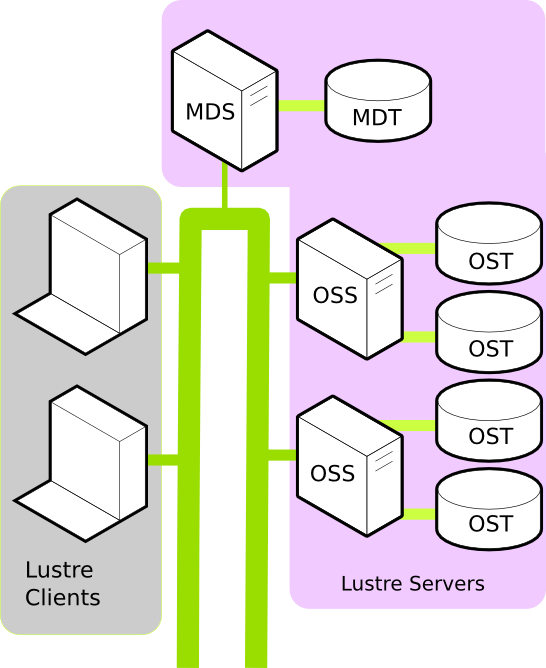
The Lustre filesystem software is build on-top of the Linux kernel. Because Lustre is designed for the most demanding high performance environments, optional modifications can be made to a stock Linux kernel to create optimized Lustre servers, but is not required. On a client, a Lustre filesystem is mounted with a Linux kernel module – and this does not need a modified kernel.
The fastest way to begin provisioning your machines into a Lustre filesystem is to use a pre-built Linux kernel with the Lustre patches already applied. A Lustre patched Linux kernel can be configured at run time to become a MGS, MDT, MDS, OSS, and OST server. An overview of these different server roles can be found in the Components of a Lustre filesystem document.

|
Whamcloud provide pre-built Lustre patched Linux kernels based on a variety of vendor distribution kernel, such as RedHat (and derivatives), SuSE, and Ubuntu. The master branch is where new feature development is done, and includes features and changes that will make it into the next release. It should not be used for production filesystems, rather only for development and testing, although each change has already passed through hundreds of hours of testing. The LTS maintenance release branch has undergone extensive testing and only receives relatively smaller changes to fix bugs, and add incremental support for new distros. The LTS release is what will typically be installed on large production systems. Further information on the Whamcloud Lustre test suite is available on the page: Testing a Lustre filesystem.
A separate page provides a Walk-thru- Deploying Lustre pre-built RPMs.
If you prefer to build from source, the instructions below should be helpful:
The Lustre filesystem code is available as source code under the GPL2 License. Patching a Linux kernel with Lustre patches requires:
Lustre patches are readily applied to a number of stock kernels and versions, these include RHEL/CentOS/Rocky/Alma, SLES, and Ubuntu/Debian. A complete list of the Whamcloud supported kernels is available on Lustre Support Matrix page.
Lustre source code available from Whamcloud repositories contains both Client and Server code. The Whamcloud Lustre source code is available at Whamcloud git repository and contains all of the release and development branches.
Patching and building a Kernel is a complex task is machine architecture, network and RAID drivers. Walk-thrus are available for the following distros:
Once the Lustre kernels and software is installed on your machines, it is time to start the filesystem and mount it on the clients.